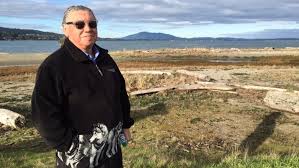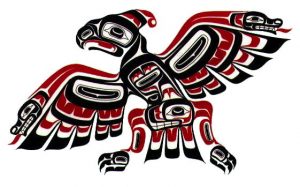In my observations of classes at Belmont Secondary, I’ve had some amazing experiences and opportunities to see real learning in progress. Some weeks ago, I chose to observe Mr. Feser’s English 11 class, not knowing what would be in store. I was in luck. On that day we had the privilege of having Elder Earl Claxton Jr. from Tsawout First Nation visit the class and present his knowledge and experience.

I had heard the name Claxton before, and I realized that I was remembering Earl Claxton Jr.’s father, Earl Claxton Sr., who was a widely respected Tsawout storyteller, educator and preserver of the Sencoten language. Earl Jr. has continued to advocate for west coast Salish First Nations and he proceeded to give us a glimpse into the past of his nation and why he continues to advocate.
To begin, Mr, Feser had already arranged the classroom in a circle so that we could all engage with each other face to face. Elder Earl brought in an authentic wood-carved Thunderbird talking stick. We began by passing around the talking stick and stating who we are and where we come from. This was the first revelation for me as I counted no less than 10 countries represented in Mr. Feser’s class. I love a diverse classroom and love the fact that Elder Earl Jr.’s talk would be something entirely new to them.
Elder Earl began by explaining one his nation’s creation stories, that of the Thunderbird who lived atop the mountain. As a child, it was said that one might encounter the Thunderbird while hiking the mountain alone. Elder Earl told us that this story was enough deterrent and he never hiked the mountain alone. 
This led into his story of how, as a young man, he actively participated in protest against a proposed resort development on Tsawout land. A land developer attempted to build a mega-resort on First Nations territory, and the band attempted to seek an injunction in court. As that was being processed in court, the development company started to move its massive machinery into the bay and dredge the seabed. Earl recounted how he and a group of band members, in -12 temperature weather with snow blowing sideways, took their boats out to meet the machinery, illegally climbing onto the rigs to halt the process. In his measured and matter-of-fact way of speaking, he told how his eyes met an RCMP officer on the rig, and there was a moment of humanity and understanding between the two. In the end, he was arrested. What was particularly interesting about the story is that the RCMP had warned his father, Earl Sr., that he would be arrested if he protested. His father’s response, “Arrest him then…do what you have to do”. Earl Jr. told us that he became a warrior in his band that day.
This was an incredibly powerful lesson and judging from the students’ reactions, they received it well. I have thought about my own approach to the classroom and I believe having authentic Indigenous voices in the classroom is absolutely necessary. I consider myself lucky. I grew up with a wealth of First Nations learning, but have never considered how I could use it in the classroom. My goal now is to dig deeper and bridge that gap.
Leave a Reply